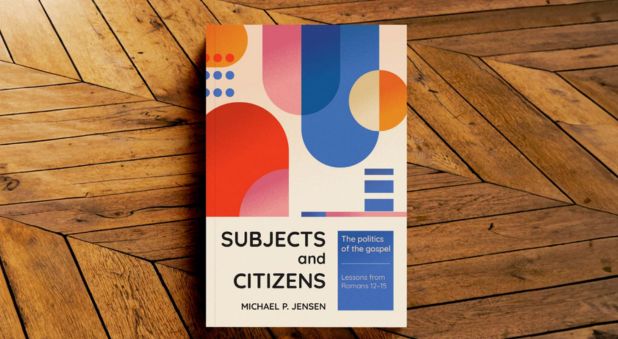Subjects and Citizens: The Politics of the Gospel (Lessons from Roman 12-15) by Michael P. Jensen (Matthias Media)
Two thousand years ago, the mighty Roman Empire bestrode the known world. In the 1st century AD, the early church was growing at the very centre of human power. The Christ movement challenged Roman order not through rebellion, but with the gospel of the risen Lord Jesus, a new way of worship, thinking and living that finally prevailed across the Empire in the late 4th century AD.
The Rev Dr Michael Jensen unpacks these two worlds for our time through an examination of Romans 12-15. Deftly weaving Christian doctrine, history, philosophy and personal reflections, he has produced a readable framework for Christian life in a secularising world.
Fundamentally, the book is about discipleship in Christian community, living now as a citizen of heaven, and tangentially, about civic engagement.
The book’s eight chapters start with the model defined by the author as Politics 1.0 – rule of humans over their affairs – and Politics 2.0, the rule of Jesus Christ in the kingdom of God. As the author points out, the “two kingdoms” concept is not new, dating to the early church. Jesus himself summarised this approach with the words “So give back to Caesar what is Caesar’s, and to God what is God’s” (Matt 22: 21).
The reader is then challenged to frame the Christian life – Politics 2.0 – as a political act. We are urged to live distinctly through loving others by radical selflessness, hospitality, respect and peace. It is an alternative to self-actualisation, the lust for power and materialism in the kingdom of this world.
While I could see where Dr Jensen’s binary definition was heading, as a former practitioner, framing the Christian approach as “politics” felt like an uneasy fit. Governing authorities are established under God’s sovereignty for the purpose of “justice and punishing evil” (p.116), but agendas are advanced through the direct pursuit, exercise and control of human power and influence. It can be messy, sinful and at its worst, dangerous.
The risk is that Christians may seek worldly power as an end in itself, or as a means to bring about the kingdom of God on earth. In the US, the emergence of churches and prominent Christian leaders as political actors has been deeply polarising – even spiritually corrupting. In Australia, Christians serve in parliaments and councils, business and civic leadership, but evidence for any groundswell of organised action is weak. If anything, the Australian polity is heading in the opposite direction.
Dr Jensen is aware of this danger and works hard to make the distinction between 1.0 and 2.0. Moreover, he reminds the reader that many organs of civil society were built on the ancient and modern Christian desire to serve others under the umbrella of Politics 2.0. Improving conditions of the poor and the sick through charitable work and systemic change is a positive exercise of power and influence for human flourishing. Today’s Australian Labor Party owes much to early Catholic and Methodist founders who were motivated by their faith to improve pay and conditions for workers and their families.
Dr Jensen’s reflections on the practice of politics is also a useful and perceptive contribution. While some of the book’s content on this read like personal reflection, he is right that on many (but not all) policy issues, there is no single Christian approach to how human flourishing is achieved. In Australian parliaments, believers who are members of parliament are on all sides of the political spectrum. They often join for regular times of fellowship yet sit on opposite sides of the House in debate.
Subjects and Citizens is a timely book. It is suitable for group discussions and will help believers contribute to public discourse and the civic fabric of society, in addition to unpacking the message of Romans 12-15 as a guide to distinctive Christian living in our modern age.
Dr Karin Sowada is an academic at Macquarie University and a former senator for NSW in the Commonwealth Parliament.























